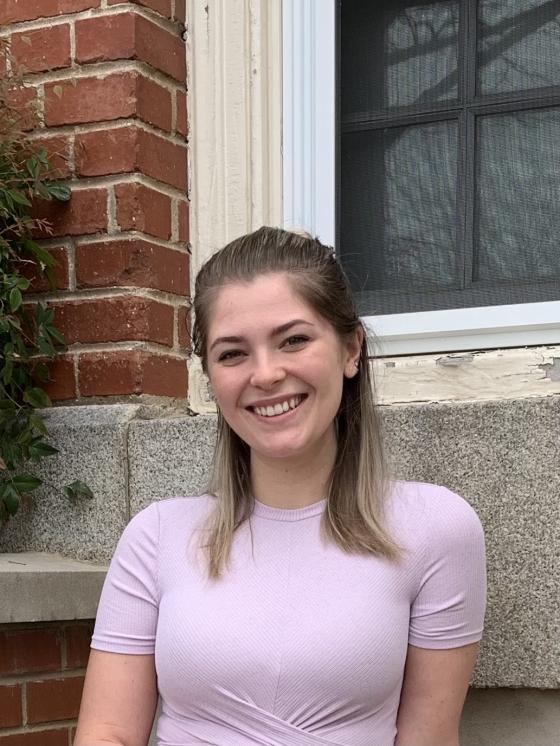
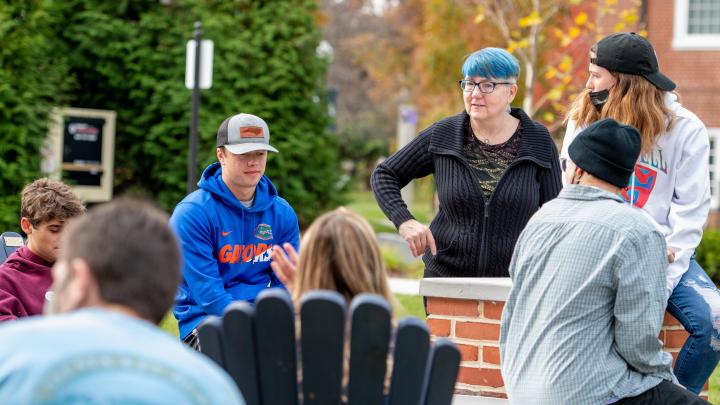
Honors Program Curriculum
Mind-Expanding Classes—Different, Not More
The Honors Program is meant to enrich your college experience rather than piling on extra work. To that end, we have designed a curriculum that allows you exemptions from certain core classes in exchange for completing levels of Honors coursework.
You also have flexibility in fulfilling upper lever Honors requirements—Honors electives, study abroad, writing a departmental honors paper or honors thesis—all of these qualify for Honors credit.
Honors classes are enhanced by field trips, guest speakers and a variety of hands-on activities and special projects. In keeping with the collaborative nature of the program, students meet as a group to decide on the topics of their senior seminars and suggest faculty they would like to teach them.
Curriculum
HON102-01 Movie Magic: Science in the Cinema; TTH 11:25AM-12:50PM
Instructor: Dr. Steven Clark
Prerequisite: FYS 101H.
Action heroes, car races, explosions, and truths that are more unbelievable than fiction– science is everywhere in the movies. Sometimes it is right; other times, they couldn’t be further from the truth. In this course, we will explore how science is portrayed in cinema from the special effects to the characters, how these portrayals influence our perception of the world, and at times, poke fun at some of the most blatant errors. Come learn whether it is “Science Fact” or just “Movie Magic,” and yes, some of your homework will be to watch movies!
HON102-02 The Human Mind; TTH 11:25am-12:50pm
Instructor: Dr. Sangeeta Gupta
Prerequisite: FYS 101H.
Welcome to "The Human Mind," an honors seminar class that explores the complex intersection of topics such as neuroscience, philosophy, psychology and art. Through a combination of discussions, debates, readings, critical thinking activities, and field trips, you will gain an understanding of and an appreciation for the mysteries and complexities of the mind. In this class, we will be using Paul Bloom’s compelling book, “The Story of the Human Mind” as a starting point, but YOU will determine the course's trajectory and shape the connections that we draw, ensuring that the topics we explore resonate with your own curiosity and passions. Ultimately, your interests will guide us through the fascinating landscape of the human mind. And you will hopefully leave with more questions than answers, igniting your curiosity and driving your pursuit of knowledge.
HON102-03: Thinking about Thinking; MW 11:30am-12:55pm
Instructor: Dr. Jen Krishnaswamy
Prerequisite: FYS 101H.
Have you ever wondered how your brain makes meaning of the complexity and wonder of the world around you? This honors seminar class is designed to help you answer this question by giving you a basic understanding of neurobiology through a combination of lectures, discussions, and activities. Topics include the senses, muscular responses, cognition, neurodegenerative diseases, and the neurobiological aspects of language. We will explore neurobiology from the scale of components of the individual cell, to the majestic and mysterious organ now contemplating itself.
HON102-04 Nature and Culture of Trees; TTH 11:25AM-12:50PM
Instructor: Dr. Scott Pincikowski
Prerequisite: FYS 101H.
Trees and culture go hand in hand. Trees have helped shaped human society and culture, and humans have shaped trees and forests, often in a negative way through overharvesting and deforestation. This course explores this relationship, focusing on the nature and culture of trees. Students will examine the ecology and nature of trees, the communities they build, and explore and analyze trees and forests in the cultural imagination by looking at different examples in art, literature, and film, and in history and society, by looking at the fundamental role trees and forests play in the development of human communities and values. Students will become “tree literate” by the end of the class, finding what trees in nature and culture ultimately say about ourselves when we make the effort to understand them.
HON202-01: Ethics of Service Learning; TTR 11:25AM-12:50PM
Instructors: Dr. Kristen Tzoc and Dr. Amy Kilpatrick
Prerequisite: HON 201
In this course, students engage in service learning by identifying and volunteering at an organization that seeks to improve a social or humanitarian condition at the local, state, regional, national, or international level; reflecting on the volunteer experience; and completing course assignments tied to the influence of values on policies and practices of their host organizations. Ultimately, this course provides students an opportunity to apply knowledge and skills of complex social issues while using ethical decision-making and values to benefit their community.
HON316 Perspectives on Global Health; TTH 9:50am-11:15am
Instructor: Dr. Mark Chee
HON397K: Decoding RomComs; MW 11:30am-12:55pm
Instructor: Dr. Marisel Torres-Crespo
Prerequisite: Sophomore, junior or senior standing in the Honors Program, or permission of the instructor
This course will explore the evolution of romantic comedy films from the 1950s to the present day, focusing on how cultural beliefs about gender roles, race, marriage, and sexuality have changed over time. We'll watch a variety of romantic comedies from each decade, read articles related to the topic, and discuss how they reflect and challenge societal norms and expectations.
HON470-01: Earthing/Unearthing; TTH 3:35pm-5:00pm
Instructor: Dr. Robert Casas
HON 470-02: Earthlings; TTR 11:25PM-12:50PM
Instructor: Dr. Shannon Kundey
Prerequisite: senior standing or permission of Honors co-directors. May not be repeated
Students take two seminar classes, FYS 101H in the fall semester and HON 102 in the spring. In addition, most students start their language requirement in the first semester, depending on placement. Check with your advisor and the Honors directors for recommendations.
FYS101H
The fall Honors First-Year Seminar (August-December) is team-taught by professors from different disciplines. Students will acquire skills in critical thinking, writing, and speaking as well as general skills for success in college and in their future.
FALL 2024 topics
Click the titles below to learn more about each topic. Honors students may choose the topic that interests them most. History & the City and Arts & the City are team-taught, as are Local Lore and Legends and The Art of Wandering, so students will get to experience two related topics with two different professors. Your "home" professor will also be your academic adviser until you declare your major.
- History & The City with Dr. Mallory Huard, History
- Arts & The City with Dr. Noel Verzosa, Music
- Local Lore and Legends with Dr. Lisa Marcus, French and Gender Studies
- The Art of Wandering with Dr. Kimberly Morse Jones, Art History
Recent field trips for the Honors fall seminar have included:
- The National Building Museum in Washington, D.C.
- Performances at The Kennedy Center in Washington, D.C.
- Zipline and obstacle course outing at Tree Trekkers in Frederick
- Walking tour of the Tidal Basin monuments, Washington D.C.
- Escape room adventures at ClueIQ in Frederick
- The National Museum of African American History and Culture, Washington D.C.
HON102
In the spring semester (January-May), students may choose one of four different sections of HON102. Each class focuses on a topic that takes an interdisciplinary approach to the sciences and technology in relation to society.
Some recent topics:
- Movie Magic: Science in Film
- Thinking about Thinking
- Plagues and Peoples
- Sustainable Diets
Recent field trips for the spring have included:
- U.S. Botanic Garden, Washington, D.C.
- National Museum of Civil War Medicine, Frederick, Md.
- Lunch at a local farm-to-table restaurant, The Orchard, in downtown Frederick
- The National Zoo, Washington, D.C.
- Antietam National Battlefield, Sharpsburg, Md.
- Collaborative work with local farms for sustainable diets class
Students take two seminar classes, Hon 201 in the fall semester and Hon 202 in the spring. In addition, most students finish their language requirement (through the 202 level) in the second semester of their second year, depending on placement. Check with your advisor and the Honors directors for recommendations.
HON201
Students can choose from a menu of classes that focus on global issues and differing cultural perspectives for HON 201, the fall seminar. They will be encouraged to imagine the world from many points of view and challenged to examine how they think about and interact with the global community.
Sample classes:
- Global Climate Change
- LGBTQ+ Global Perspectives
- Global Inequity
- Politics and Ethics
Class field trips for HON 201 have included:
- Symposium on January 6th, Washington D.C.
- Frederick County landfill
- Crime Museum, Washington D.C.
HON202
Students will work closely with a faculty advisor of their choice for the spring semester practicum. Each student chooses a social or intellectual problem to address, writes a research paper and works at an off-campus site, gaining experience and connections that may also lead to paid employment or help determine a future career. The broad, overarching theme of this class is social justice, but the sites students at which students have chosen to volunteer are many and varied.
Recent practicum sites have included:
- Heartly House
- Frederick Health Hospital
- Housing Authority of Frederick
- Delaplaine Visual Arts Center
- Frederick Rescue Mission
- I Believe in Me
- Civil War Medicine Museum
- Halfway African American Cemetery
- Monocacy National Battlefield
Sample research papers:
- “Power Shifting and Getting in Gear: The Youth Movement Toward a Sustainable Future” Site: Energy Action Coalition
- “19th Century Health Care” Site: National Museum of Civil War Medicine
- “Environmental Justice Through the Eyes of the Deep Ecologist” Site: Catoctin Zoo
- “Slavery and Social Injustice”
- “Acid Victims: A Spotlight on Social Injustices Faced by Women in South Asian Countries” Site: Frederick Memorial Hospital
Students choose upper-level honors electives from a wide array of options, many of which are based on student requests. Students may also elect to study abroad; sites chosen by Honors students include France, Spain, England, Ireland, Scotland, Germany, Italy, Mexico, Israel, Korea and New Zealand. Study abroad counts as one honors elective. Students who successfully complete a departmental honors paper also receive credit for one honors elective.
Sample Honors electives:
- Impact of Social Media on Society
- Censorship in America
- Revisioning Motherhood in Modern Western Culture
- The Chesapeake Bay
- Food and Culture
- American Landscapes: Environmental Literature in the US
- Exploring Utopia
Class field trips for upper-level electives have included:
- Museum of African Art, Washington, D.C.
- Maryland State Police Computer Forensics Lab, Columbia, Md.
- Special Beginnings Birthing Center, Arnold, Md.
- National Gallery of Art, Washington, D.C.
The senior seminar is a high point of the honors program, when students reflect on their experience in the Honors Program. Students choose a topic of broad interest and select a faculty member to teach the course. Sample seminar classes:
- Beauty and Culture
- Impact of Social Media on Society
- Philosophy of Love and Sex
- Why Us? The Success and Failure of Humanity
The Honors Program welcomes qualified transfer students. More information about the requirements for transfer students can be found in the Hood College Catalog. Requirements differ depending on the level of involvement a student had with Honors at their prior institution. Transfer students work closely with the Honors co-directors to identify which requirements of the Honors Program apply to them.
Transfer students may satisfy the Honors global language requirement in one of the following ways:
- Demonstrate proficiency in a global language through the 202-level (by coursework or placement exam)
- Successfully complete any two global language courses
- Complete one global language course and one approved culture course:
Complete one global language course and one of the following:
ANTH 302 Cultural Anthropology
ECON 304 International Political Economy
ECON 317 Economics of Development
GER 301 Berlin in the 20th Century
GLBS 301 Human Migrations: Refugees and IDPs
GLBS 345 Global Persp/Women, Power & Politics
HIST 347 The Indigenous World
HIST 356/357 Global Empires I/II
HON/PHIL 316 Perspectives in Global Health
MEST 300 Cultures of the Middle East
NUR 300 Global Learning Exp/Healthcare & Nursing
The Honors Program welcomes qualified early college students who have completed an AA, or equivalent, during their high school years. Students with 30 or more credits from International Baccalaureate (IB) programs may also qualify, with director approval.
Early college students must take the First Year Seminar in their first semester at Hood. Their progression through the Honors Program is as follows:
- FYS 101H First Year Seminar Honors
- HON 202 in spring semester first year
- 2 300-level Honors electives (or substitute study abroad or departmental honors)
- 1 Hon 470
They are considered transfer students for the purpose of Honors Program language requirements, which means they may satisfy the global language requirement in one of the following ways:
- Demonstrate proficiency in a global language through the 202-level (by coursework or placement exam)
- Successfully complete any two global language courses
- Complete one global language course and one approved culture course:
Complete one global language course and one of the following:
ANTH 302 Cultural Anthropology
ECON 304 International Political Economy
ECON 317 Economics of Development
GER 301 Berlin in the 20th Century
GLBS 301 Human Migrations: Refugees and IDPs
GLBS 345 Global Persp/Women, Power & Politics
HIST 347 The Indigenous World
HIST 356/357 Global Empires I/II
HON/PHIL 316 Perspectives in Global Health
MEST 300 Cultures of the Middle East
NUR 300 Global Learning Exp/Healthcare & Nursing

Mind-Expanding Classes—Different, Not More
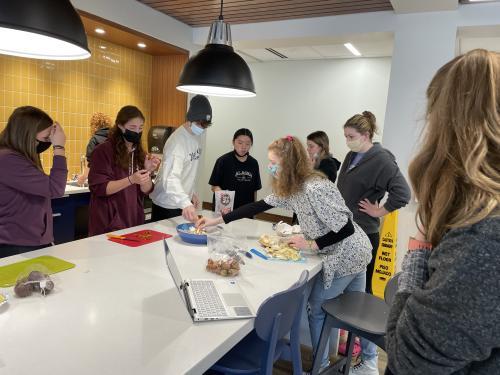
Honors 102 students sample fruits from other continents as they learn about sustainable diets!
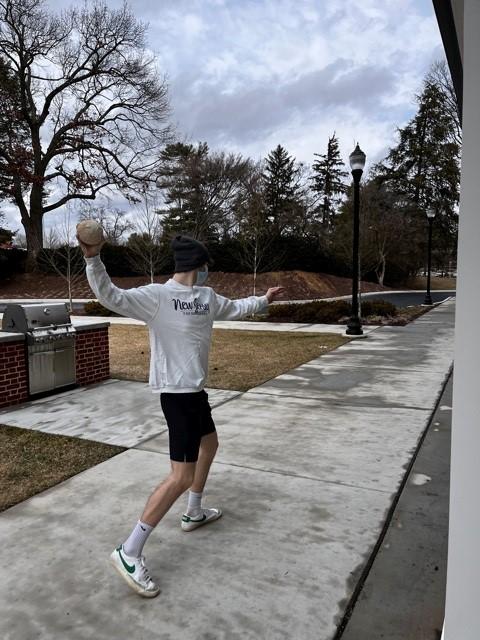
In the Sustainable Diet course, students explored foods from a variety of cultural traditions and parts of the world.
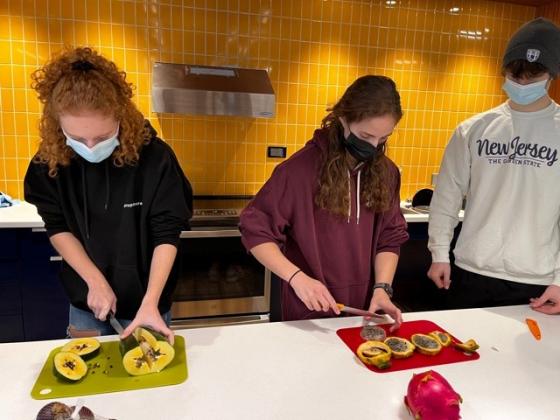
In the Sustainable Diet course, students explored foods from a variety of cultural traditions and parts of the world.
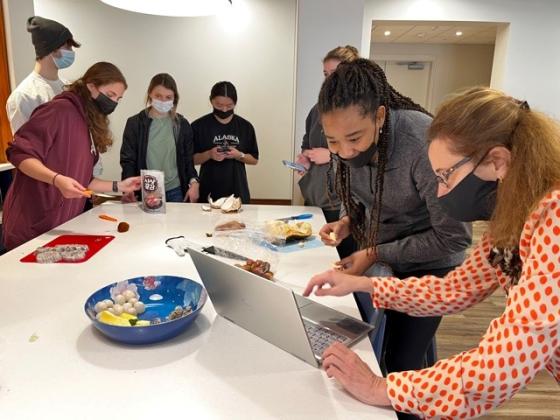
In the Sustainable Diet course, students explored foods from a variety of cultural traditions and parts of the world.
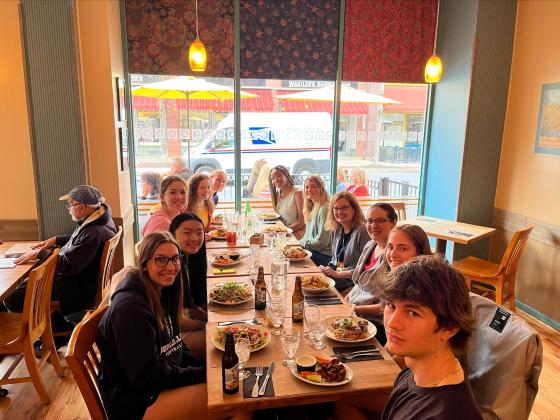
Honors class, The Sustainable Diet, evaluating the Orchard Restaurant downtown Frederick as a Farm to Fork restaurant with Gina Gohl from the Hood College Food Security Network.
Are you ready to say Hello?
Choose a Pathway
Information will vary based on program level. Select a path to find the information you're looking for!
